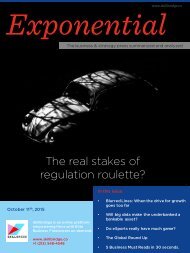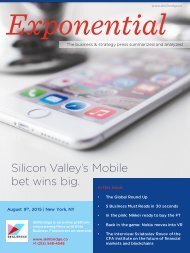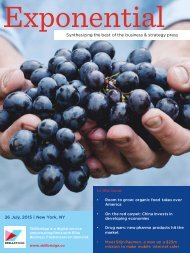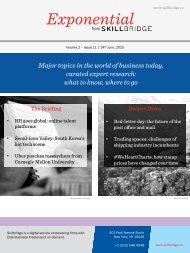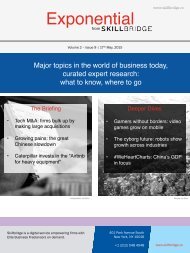Exponential - Sept 6th 2015
In this issue: Getting the circular economy into motion - It’s complicated: Organic brands and Big Brand Food - Tesla Motors’ new model: The Handbag - The Global Round Up - 5 Business Must Reads in 30 seconds.
In this issue: Getting the circular economy into motion - It’s complicated: Organic brands and Big Brand Food - Tesla Motors’ new model: The Handbag - The Global Round Up - 5 Business Must Reads in 30 seconds.
- No tags were found...
Create successful ePaper yourself
Turn your PDF publications into a flip-book with our unique Google optimized e-Paper software.
www.skillbridge.co<br />
<strong>Exponential</strong><br />
The business & strategy press summarized and analyzed<br />
Do tech giants need<br />
to care more?<br />
In this issue:<br />
:<br />
<strong>Sept</strong>ember 6 th <strong>2015</strong><br />
Skillbridge is an online platform<br />
empowering firms with Elite<br />
Business Freelancers on demand.<br />
www.skillbridge.co<br />
+1 (212) 548-4548<br />
• Getting the circular economy into motion<br />
• It’s complicated: Organic brands and Big<br />
Brand Food<br />
• Tesla Motors’ new model: The Handbag<br />
• The Global Round Up<br />
• 5 Business Must Reads in 30 seconds.<br />
1 +1 (212) 548 4548 www.skillbridge.co
<strong>Exponential</strong> the Skillbridge Magazine<br />
The global round-up<br />
KPMG’s London club<br />
KPMG launches a private members’<br />
club this month in London’s Mayfair<br />
district, a magnet for the global super<br />
rich: thought to be the first venture of<br />
its kind by a corporate. Partners and<br />
clients will enjoy access to the<br />
decedent and luxurious five-story<br />
townhouse at No. 20 Grosvenor<br />
Square, which boasts business and<br />
washroom facilities and a restaurant,<br />
but clients will need to be<br />
accompanied by a KMPG staff<br />
member to get a drink at the bar<br />
Spanish firms visit Iran<br />
waklingsf via<br />
flickr<br />
Spain is sending an economic<br />
delegation to Tehran next week<br />
comprising representatives of 70<br />
Spanish companies, to discuss<br />
infrastructure projects and cooperation<br />
in the energy sector in the<br />
wake of July’s nuclear deal. This<br />
follows visits by top French, German,<br />
Italian and UK firms<br />
2 +1 (212) 548 4548 www.skillbridge.co
<strong>Exponential</strong> the Skillbridge Magazine<br />
Google to return to China<br />
Google is set to return to mainland China,<br />
five years after it fell out with the<br />
Chinese government over hacking<br />
allegations. The company reportedly<br />
expects approval to launch a Google Play<br />
App store for the Chinese market as early<br />
as this fall, enabling it to sell software for<br />
Android devices including wearables<br />
Drive for more female Japanese<br />
business leaders<br />
Japanese legislators have approved a<br />
law requiring companies of more than<br />
300 employees to set and publicise<br />
targets for hiring or promoting women<br />
as managers. Prime Minister Shinzo<br />
Abe, who has declared his<br />
commitment to increasing the share of<br />
women in leadership positions to 30%,<br />
says he wants Japan to be a society<br />
where "women shine”<br />
3 +1 (212) 548 4548 www.skillbridge.co
<strong>Exponential</strong> the Skillbridge Magazine<br />
Do tech firms need to show a<br />
more caring side?<br />
• Tech’s big guns including Amazon, Google, Spotify and Netflix under fire<br />
• Amazon accused of making employees cry at their desks<br />
• McKinsey: “it will be action – not spin – that builds strong reputations”<br />
‘Don’t be Evil’<br />
:<br />
The darlings of the technology world are finding their message<br />
is unsettling employees, politicians and customers alike. In<br />
recent weeks, Amazon came under fire after The New York<br />
Times’ ‘revelations’ about demands on its white collar workers,<br />
allegedly driving some to cry at their desks. Google’s ‘Don’t be<br />
evil’ ethics were again questioned as it faced EU anti-trust<br />
charges and rejects the essence of them. But does this negative<br />
coverage of their business practices affect their bottom line?<br />
4 +1 (212) 548 4548 www.skillbridge.co
<strong>Exponential</strong> the Skillbridge Magazine<br />
Do perceptions really matter?<br />
Some commentators argue that these issues of perception don't<br />
matter in the scheme of things. An analysis of the matter in<br />
Fortune points out that for every malcontent at Amazon there are<br />
others who think they’re “doing something worthwhile, perhaps<br />
even revolutionary”. Others say that the drive for growth means<br />
tech firms can't afford to be kind. The fantastic impracticality of<br />
many of Google’s projects now arrayed in the Alphabet “man<br />
cave” shows how it confounds the rules ordinary companies<br />
cannot opines the FT, but it goes on to argue, if you appear nasty<br />
or arrogant, "it is bad business. Powerful people, particularly<br />
politicians, have an incentive to hurt you”.<br />
A reputational House of Cards<br />
Google’s perceived arrogance has perhaps made it the target of<br />
politicians around the world, notably the Indian government and<br />
the EU which are actively pursuing anti-trust cases. The search<br />
giant aggrieved the EU by complying with "right to be forgotten”<br />
laws in a way that to the bureaucrats’ eyes seemed to undermine<br />
the spirit of the privacy legislation. Consumers too are raising<br />
their voices: angry protests followed Uber’s surge pricing during<br />
Hurricane Sandy leading to legislative pressure, which forced a<br />
cap on pricing after natural disasters. Even the benefits they offer<br />
employees are publicly scrutinised – Netflix, by offering their<br />
white-collar workers "unlimited" parental leave, was slammed by<br />
petitions and even a derogatory House of Cards spoof by women’s<br />
rights advocates for failing to give its low-paid workers the same.<br />
What the brains think…<br />
Tech disruptors appear somewhat vulnerable to perception<br />
issues on a number of fronts as their core assets are human - few<br />
want to work at a company that is perceived negatively. “Now<br />
more than ever, it will be action—not spin—that builds strong<br />
reputations” concluded a McKinsey report on corporate<br />
reputation. The trends it described - growing influence of<br />
indirect stakeholders such as NGOs, greater scrutiny through<br />
online platforms, declining trust in business – have grown more<br />
pronounced. The FT concludes, “they need to learn to deploy the<br />
emollient, tactical culture” of “stuffy multinationals”. Arguably<br />
this is by improving stakeholder management, not just<br />
shareholder management.<br />
Key Reading<br />
• FT: Silicon Valley's<br />
young guns<br />
• New York Times:<br />
Google Antitrust<br />
Inquiries Spread<br />
Over Globe, With<br />
India the Latest<br />
Problem<br />
• Fortune: Amazon:<br />
Dystopian nightmare<br />
or just another<br />
successful tech<br />
company?<br />
• McKinsey:<br />
Rebuilding corporate<br />
reputations<br />
5 +1 (212) 548 4548 www.skillbridge.co
<strong>Exponential</strong> the Skillbridge Magazine<br />
Getting the circular<br />
economy into motion<br />
• By 2030, a circular economy could benefit by €1.8 trillion a year in the EU alone<br />
• The US is also embracing the idea, with Ford and Dell leading way<br />
Heavenly circles<br />
:<br />
The circular economy is an alternative to the current linear<br />
“take–make–dispose economy” embedded in most industrial<br />
operations. In contrast, it looks at products through their lifecycle<br />
and seeks to see the resources that get put into products,<br />
such as embedded materials, energy, and labor be re-used in<br />
some shape or form, such as refurbishment, recycling or<br />
repurposing of components. A new McKinsey report estimates<br />
that by 2030, a circularised economy could benefit by €1.8<br />
trillion a year in the EU alone: a 7% GDP increase on present<br />
forecasts.<br />
6 +1 (212) 548 4548 www.skillbridge.co
<strong>Exponential</strong> the Skillbridge Magazine<br />
What’s driving the circular economy?<br />
In the US the economic advantages around cost and carbon<br />
efficiency are making companies like Ford embrace this model.<br />
The Michigan based auto giant cites insulation from oil price<br />
volatility as a driver. Dell in implementing a ‘closed loop plastic<br />
recovery’ system, points to cost savings given their use of 10m kg of<br />
plastic a year. Environmental certifications such as LEED<br />
advocate practices harmonious to the principles of a circular<br />
economy and are helping drive the movement. However, questions<br />
remain over how easy it will be to push businesses to take on extra<br />
costs by changing processes, even if promised long-term savings.<br />
Both Startups and Corporates are driving innovation.<br />
Examples of companies starting to embrace this model are<br />
visible today. Leasing and take-back schemes or in-store<br />
collection programs are common. Swedish chain H&M’s<br />
‘Garment Collecting Scheme’ puts old clothes out for “rewear,<br />
reuse or recycling”. Designing products using the purest<br />
materials, as Dutch carpet manufacturer Decco does, facilitates<br />
reuse. More aggressive initiatives include the work of US startup<br />
Evocative, which makes packaging out of bio-waste and the<br />
fabric of mushroom root networks and is working on mushroombased<br />
insulation and grow-it-yourself kits. The ‘internet of<br />
things’ trend is seen as a boon to the circular economy movement,<br />
by making it easier to monitor and track components in use.<br />
What the brains think…<br />
The potential benefits of getting away from a linear conception<br />
of industry are massive, as McKinsey’s Markus Zils argues. In<br />
2014, McKinsey estimated global savings on materials alone<br />
from a circular economy at scale to be $1 trillion. However,<br />
maximising circularity requires huge changes in business<br />
culture – better reverse network management capabilities;<br />
companies co-operating in the pre-competitive sphere. It also<br />
needs "a lot of players to change simultaneously" (and ideally<br />
governments to take the lead with procurement) writes Philips<br />
CEO Frans van Houten. And that, he admits, is "a chicken-andegg<br />
problem".<br />
Key Reading<br />
• McKinsey: Europe's<br />
circular-economy<br />
opportunity<br />
• FT: Sustainable<br />
innovation: shaped<br />
for a circular<br />
economy<br />
• The Guardian: How<br />
the circular economy<br />
is taking off in the US<br />
7 +1 (212) 548 4548 www.skillbridge.co
<strong>Exponential</strong> the Skillbridge Magazine<br />
It’s Complicated: Organic<br />
Brands and Big Brand Food<br />
• Sales of organic-certified packaged foods up 14.7% in 2014 while other<br />
packaged food sales flatline<br />
• Laurie Demeritt, Hartman Group: “Consumers don’t outright believe big<br />
brands are bad”<br />
The organic boom<br />
:<br />
US demand for organic and “natural” foods is booming, creating<br />
opportunities for start-ups and Big Food alike. Retail sales of<br />
organic-certified packaged foods jumped 14.7% in 2014 and<br />
those labeled "natural" 11.7%, while packaged food sales as a<br />
whole grew just 1.4%. Facing declining market share, big brands<br />
have responded by adjusting their own recipes, acquiring small<br />
organic food companies - Campbell's buying Bolthouse Farms;<br />
General Mills purchasing Annie's Homegrown - and offloading<br />
lines of frozen and processed foods such as General Mills’s sale<br />
of Green Giant last week.<br />
8 +1 (212) 548 4548 www.skillbridge.co
<strong>Exponential</strong> the Skillbridge Magazine<br />
A bad taste in the mouth<br />
But corporate buyer beware. Kellogg's experience with Kashi<br />
which it acquired in 2000 shows potential pitfalls for big<br />
brands. When run autonomously, Kashi prospered with sales<br />
growing 42% annually on a compound basis in the first 8<br />
years. Around 2007, Kellogg HQ appeared to start exerting<br />
more control over decisions and imposed its own sales team.<br />
Kashi lost its deft, innovative edge. Then a grocery store<br />
owner posted online that he removed some Kashi products as<br />
he had discovered they contained GMO ingredients.<br />
Shoppers who had been buying a "natural" product felt<br />
misled, in a nation where some 92% of people think food<br />
containing GMOs should be labelled as such. Sales fell from<br />
around $600 million in 2008 to $398.3 million last year.<br />
Complicated office politics<br />
While Kellogg announced it would remove GMOs from<br />
selected Kashi products, the scandal was given fresh impetus<br />
when it emerged that Kellogg helped fund a campaign<br />
against mandatory GMO labelling in California. A former<br />
executive has been brought back and the plan is to return to<br />
Kashi’s early 2000s product strategy to win back customers.<br />
That may be tricky given the trust gap that has opened up,<br />
suggests the Wall Street Journal.<br />
What the brains think…<br />
“Consumers are demanding more information, but they don’t<br />
outright believe all big companies are bad” says Laurie<br />
Demeritt of The Hartman Group. “About 10%-12% feel like<br />
that. The vast majority...want to know your story, and so long<br />
as you’re authentic and communicate, then great”. She adds<br />
most shoppers have no idea which companies own which<br />
lines. Organic-only start-ups may be best positioned to<br />
become the next generation of big brands. Referring to<br />
organic conglomerate Hain Celestial, a 2012 KPMG report<br />
observes that "with revenues of $1.13bn, it's living proof that<br />
it is possible to monetize organic, given time".<br />
Key Reading<br />
• WSJ: Inside<br />
Kellogg's effort to<br />
cash in on the health<br />
food craze<br />
• Guardian: Big food is<br />
going green, but will<br />
consumers buy in?<br />
• Guardian:Is the era<br />
of Big Food coming to<br />
an end?<br />
• Fortune: The war on<br />
big food<br />
9 +1 (212) 548 4548 www.skillbridge.co
<strong>Exponential</strong> the Skillbridge Magazine<br />
Tesla’s way to bag<br />
more business<br />
Thanks for Buying a $100,000 Tesla. Want a Tote Bag<br />
With That?<br />
Tesla has launched a refresh of its 200 retail stores<br />
around the world, where it sells products from its own<br />
fashion line such as a $300 tote bag and $100 sheepskin<br />
driving gloves; cycling jerseys are to go on sale in<br />
October. The stores, along with the hiring of former<br />
Burberry executive Ganesh Srivats as head of North<br />
American sales, are part of a luxury brand- building<br />
strategy to seduce new customers and keep current ones<br />
loyal ahead of the first deliveries of the Model X SUV<br />
later this month.<br />
10 +1 (212) 548 4548 www.skillbridge.co
<strong>Exponential</strong> the Skillbridge Magazine<br />
Winners and Losers<br />
Bad Week For: Glencore<br />
Bad Week For: Moscow trips<br />
Good Week For: Facebook<br />
The social media giant announced that for the first time,<br />
one billion users had logged in on a single day, Monday 24<br />
August. This represents one in seven of the world’s<br />
population, or two-thirds of Facebook’s 1.49 billion active<br />
monthly users. As of midday EST Sunday, 211,400 users<br />
had “liked” Mark Zuckerberg’s post announcing the news.<br />
Shares in the mining conglomerate registered their biggest<br />
weekly decline since the company went public in 2011,<br />
falling 17%, as anxieties around the Chinese metals market<br />
continue. Glencore has seen half its market value wiped off<br />
the charts this year.<br />
Good Week For: ZTE<br />
The Chinese company is now ranked fourth among<br />
smartphone makers in the US, behind Apple, Samsung<br />
and LG with around 8 per cent of the market. With its<br />
products the cheap phones of choice for 3 of the big 4 US<br />
carriers, ZTE’s next challenge is to convert high sales into<br />
high revenues<br />
The Russian capital has been voted the world’s unfriendliest<br />
city by Travel + Leisure readers out of 266 contenders, for the<br />
“aloofness” of its citizens. It also came bottom for quality of<br />
food. Close behind it for surliness were Atlantic City and LA.<br />
11 +1 (212) 548 4548 www.skillbridge.co
The Briefing<br />
<strong>Exponential</strong> the Skillbridge Magazine<br />
Five key reads<br />
aiigle_dore via flickr<br />
Economist: Faster, cheaper fashion<br />
APPAREL– Irish discount retailer Primark arrives in the US this<br />
week with a store in Boston, to be followed by seven others. With<br />
its ultra-fast fashion approach it sells more clothes than any other<br />
retailer in the UK, undercutting rivals such as H&M by twothirds,<br />
and its share of the world apparel market has quadrupled<br />
over the past decade. “Consumers shop at Primark differently,”<br />
says Bernstein’s Jamie Merriman. “It’s almost like shopping at a<br />
Costco, where you’re thinking about it in terms of volume.” The<br />
chain is betting on elastic demand for clothes and on the<br />
“Instagram effect”, but may find unexpected challenges in the US<br />
market, and its lack of online business may lessen its impact if<br />
there is a trend towards buying clothes through social networks.<br />
Bloomberg : Emerging markets are still the future<br />
GLOBAL ECONOMY – World financial meltdown may not be on<br />
the cards after all, argues Michael Schuman. In spite of investors<br />
pulling $900 billion out of the world's 19 largest emerging<br />
economies in 13 months, in expectation of US interest rates rises,<br />
nations such as Indonesia have weathered the outflows without<br />
fully-fledged economic crisis. Neil Shearing of Capital<br />
Economics reasons they have lower levels of foreign currency<br />
debt than historically, making them more resilient. Michele<br />
Mazzoleni of Research Affiliates points to historical evidence<br />
showing that when rates rise on the news of a strong US<br />
economy, as would be the case now, capital flows into developing<br />
markets. Longer term, we should direct our focus on the fact that<br />
consumption in developing countries is on course to be twothirds<br />
of the world's total by 2050.<br />
12 +1 (212) 548 4548 www.skillbridge.co
<strong>Exponential</strong> the Skillbridge Magazine<br />
The Briefing<br />
Economist: Why a universal flu vaccine may soon be a reality<br />
VACCINES - Two groups of scientists in the US may be a step<br />
closer to creating a universal flu vaccine, offering protection for<br />
years or possibly a whole lifetime against the influenza virus.<br />
Current vaccines work by triggering immunity against a protein,<br />
hemagglutinin, but the head of this molecule mutates readily,<br />
changing from one flu strain to the next. Both research groups<br />
have now found a way of isolating and holding together the<br />
harder-to-reach molecule stem so that this can be presented to<br />
animals’ immune systems. A universal vaccine would end the<br />
problem of seasonal jabs that fail to match the most virulent flu<br />
strains that year, and improve protection against flu pandemics,<br />
against which human populations have little or no immunity.<br />
HBR: The emotions that make us more creative<br />
WORK ENVIRONMENTS - “Odd how the creative power brings<br />
the whole universe at once to order” remarked Virginia Woolf.<br />
Research by Christina Fong at Carnegie Mellon University now<br />
suggests that the confusing sounding state of “emotional<br />
ambivalence” - simultaneously feeling emotions not typically<br />
experienced together, as might happen during organizational<br />
recruitment and socialization processes - signals a sensitivity to<br />
unusual associations that contributes to creativity. University of<br />
Pennsylvania psychologist Scott Barry Kaufman suggests that<br />
managers look beyond simplistic ideas of encouraging positive<br />
employee emotions to promote innovation, and pursue emotional<br />
ambivalence and other metrics such as motivational intensity to<br />
“embrace the inherent messiness of the creative process”<br />
Time: Lack of sleep dramatically raises risk of getting sick<br />
SLEEP - A study in the journal Sleep finds that those who get less<br />
than six hours of sleep a night are four times more likely to catch<br />
a cold than those who get more than seven hours, and that<br />
amount of sleep is one of the strongest predictors of getting sick,<br />
even more than a person’s age, body mass or stress levels. Lead<br />
author of the study Aric Prather says shortened sleep seems to<br />
alter the inflammatory response, which in ordinary<br />
circumstances helps our bodies clear out viruses.<br />
13 +1 (212) 548 4548 www.skillbridge.co
<strong>Exponential</strong> the Skillbridge Magazine<br />
We heart h charts<br />
Trane de Vore via flickr<br />
Life expectancy<br />
Data adjusting life expectancy at birth<br />
for the number of years of good<br />
health. Improvements in longevity in<br />
the US have been at such a slow rate<br />
that the average Iranian man born<br />
today is expected to live longer than<br />
his counterpart in the US<br />
Source: The Economist<br />
Largest companies across the US<br />
Can you guess which is each state’s<br />
top company by revenue, if you locate<br />
the firms to the address of their<br />
corporate HQ? There are some<br />
surprises, perhaps: no McDonald’s,<br />
CocaCola, Target, Apple or Microsoft<br />
to be found<br />
Source: Broadview Networks<br />
Emerging Bear Markets<br />
Following China’s rate cut, last week 15 of<br />
the 30 largest equity markets of emerging<br />
economies dipped from their peaks by 20<br />
percent or more – the traders’ definition<br />
of a bear market<br />
Source: CB Insights<br />
14 +1 (212) 548 4548 www.skillbridge.co




